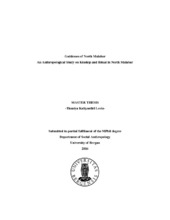| dc.description.abstract | This study explores the relationship between kinship and the ritual theyyam worship of North Malabar region in the state of Kerala, India. Theyyam is a socio-religious ritual in which mythological, divine, ancestral, animal, serpent or heroic characters are represented, each with its distinct physical shape and story of origin. Moreover, it is an attempt to investigate the relationship between ritual and kinship at a point in time when there is a transformation of the kinship system on which the ritual is constructed. The thesis aims to explain North Malabar, the theyyam worship and the kinship system separately and then reaching a common ground of discussion on how the changes in the kinship pattern initiated by colonial legislation reflect on the society and in turn on the ritual performance. The study overall suggests that the encompassing and dominant element in North Malabar personal identity is the tharavad-joint family, and that the tharavad is the locus of theyyam roles (and other prerogatives). The major way that the tharavads can celebrate and express their religious faith or convictions is through the theyyam the theyyam being not a cultural spectacle (performance) but religious worship. Theyyam is fundamentally a product of collective life and the theyyam knowledge will be used by, and kept moving through, networks of kinship and the tharavad. The collective theyyam knowledge has been in existence for many centuries in the form of stories and songs, maintained through a joint family tharavad and passed on from generation to generation. But all the collective knowledge which existed in that system was shattered after the disintegration of the tharavad. The reservoir of the collective knowledge related to theyyam now resides with the great grand parents whose prominence - along with their goddesses - are fading from the nuclear family oriented North Malabari's day to day life. The fieldwork on which this ethnography is based was conducted in the region of North Malabar in the northern part of Indian state of Kerala. The methodology used in this research include both archival works and the collection of ethnographic data. How changes in the kinship patterns are interwoven with the ritual practices were captured through fieldwork. Oral sources were tapped by conducting interviews - both individually and in groups - with the aim to gather materials on cosmology in the form of myths related to tharavad and theyyam, placing specific importance on Goddesses in Theyyam; and to understand changes in the caste identities. Primary sources, both unpublished and published records as well as secondary sources, have also been utilized for the research. People's recollections were recorded to the extent traceable. | en_US |
